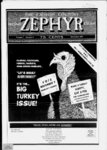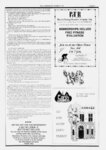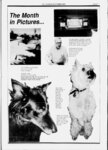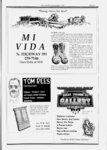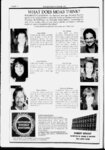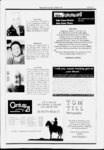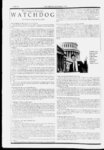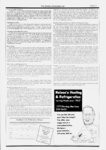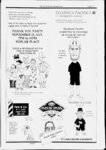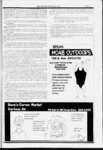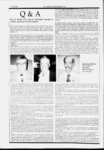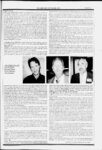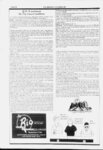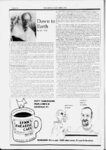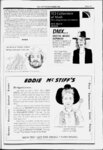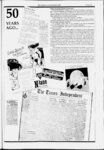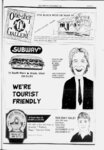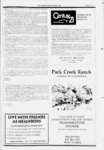| OCR Text |
Show THE ZEPHYRNOVEMBER 1995 PAGE 22 Q&A The six Moab City Council candidates respond to written questions from the Zephyr. Editor's Note: Two weeks ago, I sent written questions to each of the candidates and requested written responses by October 20. They all complied and their answers are printed below. I should point out that I have printed those replies verbatim. I made no attempt to correct spdling or grammatical errors. I don't fed that particular responsibility lies with this newspaper. ...S. Many people believe that an expanded tax base means a reduced individual tax burden. But Moab City does not impose property taxes on businesses (not to mention residential property owners). So where is the advantage to the unlimited growth pattern we're seeing in Moab, particularly when you consider that this kind of growth also accelerates property values and has an adverse effect on property tax rates on a county level? Cockayne: I don't have enough information at this time to give an honest and accurate answer. Cooke: There is little initial benifit to the taxpayer from the expanded tax base generated by new businesses and virtually none from new residential development. Increased sales tax revenues are largely absorbed in providing city services to the new users, who also require large amounts of city staff time in the planning, inspection and public works departments. In the long run, after the growth period is past, new Moab is not dying a natural death by sitting back and doing nothing to try to survive in a world where everyone is vying for the tourist dollar. Moab is one of the most beautiful tourist destinations around. No doubt we all would like to see a "clean, no smoke stack, environmentally safe, non controversial, high wage paying" business in Moab. But, let's face reality, Moab like so many other small towns all across this great country of ours does not have what it takes to attract that type of business. Whether we all agree that tourism is the answer it is for a fact here and we must take the bad with good. Nationally franchised restaurants are moving to Moab at a remarkable rate. As a restaurants are seeing a decline in business. Soon, other result, many locally-owne- d national chains are likely to consider Moab...from bookstores like B. Dalton, orvideo stores like Blockbuster. What would you do, if anything, to protect further erosion businesses? If the answer is nothing, does that mean you believe of locally-owne- d long-tim- e residents of Moab must eventually give way to what has been called "New Moab?" Cockayne: Competition in business is part of our national system. As a 2 year business owner myself I know the feelings one might go through. You just have to be the best you can and don't let the big one's scare you. Cooke: Its probably too late to implement serious restrictions on franchise "colonization" of our local business community. I would support a ban if there were public support for it, but the horse is out of the bam on this one. Closing the door now would still provide some local business protection, but I doubt we will see it. Moab's business community will likely continue to more nearly resemble a suburb of Denver or Salt Lake but we can live with that, and there are bigger, more crucial issues to address, unless Moab's citizens direct their council members otherwise. Johnson: Attempts to prohibit national or indeed international companies from obtaining licences and permits from doing business in a particular city, county or state have always been struck down by federal courts. So long as a business is legitimate and lawful we can not discriminate against it based on the residence of the owners. THE INCUMBENTS (Left to Right) Dan Mick Bill McDougald Terry Warner businesses would contribute positively to overall city revenues in excess of services they consume. Residential users would pay their share in terms of normal monthly assessments for city services: water, sewer and garbage. But the expanded capacity necessary to add these new users to city systems creates a financial drain on city taxpayers and service users, as reflected in recent large increases in garbage and sewer rates. Nor is expanded coverage by police and fire departments recouped by simple expansion of the tax base. The city can only protect its citizens from financial subsidy of growth in terms of paying greatly increased fees for services by assessing impact fees or their equivalents upon new growth. Costs of expanded services must be born by new users or present users foot the bill. The present lack of a mechanism to asses costs of growth in this manner and the unwillingness of some current council members to institute measures to protect our citizens is one of the main reasons I am a candidate. The current attitude toward growth cannot be maintained without causing unfair burdens and hardship, particularly upon residents on fixed and low incomes. Johnson: First, unlimited growth is a physical impossibility due to the geographical makeup of the valley and established boundries of the city. The benifits of orderly and planned growth to the residents of the city of Moab are of course reflected in greater employment opportunities, increased sales tax revenue and greater divirsity of goods and services available within the city. McDougald: The unlimited commercial growth and development over the past five years has increased property taxes and sales tax revenues greatly. Currently county, state and schools dictate most tax rates. The city has directly benefitted from increased gross business and sales tax revenues. Mick: There arc few if any advantages too unlimited, out of control growth patterns. I believe in planned, quality growth. Quality growth will provide an expanded tax base too more evenly distribute the Grand County and City of Moab tax burden for schools, hospitals, needed infrastructure, police and fire protection. The growth we are now experiencing is due to demands being placed on the City of Moab and Grand County by everybody who loves this magnificent countiy we live in, residents and nonresidents alike. Because of this the city has made an attempt to distribute this tax burden equally between both, by charging a 2 percent gross business license foe or sales tax, on all purchases. This two percent is part of what the city government runs on. Warner First of all let me say that you are correct in stating that an expanded tax base does indeed reduce ones individual tax burden. And, that Moab City does not impose a property tax. Second, I'm not sure that an unlimited growth pattern exists. Moab's growth is naturally, physically and economically limited. Third, it is true that property values are increasing in Moab but so is the rest of the real world. At least ky Would you prohibit county residents from establishing business in the city? Or give priority only to long term city residents? As to the so called "New Moab", I'm sure the Ute, Piute, and Navajo people were opposed to the influx of newcomers during the "Pioneer Times." McDougald: Free competition is the American way to grow. Normally the city does not exercise any control on commercial growth except to limit the number of beer halls and taverns. Mick: I have asked a number of restaurants this pass week "How's business?" The overwhelming response has been "Great." When asked about nationally franchised restaurants taking their business I was told we have a strong Moab following who cat here and recommend us to visitors. We give good value for their money anyone who doesn't will not succeed whether it be a local or a National chain. Personally I would rather eat where I get good food, good service, and good value and be allowed to make that choice from lots of different sources, the same is true of all my purchases, clothes, movies, books, hardware etc. Warner How many restaurants, motels etc. can survive in Moab? Only time will tell. It appears to me that the well established "long time residents" have and are surviving the competition by offering what is dictated by the supply and demand. 1 still enjoy a local burger, barbecue and occasional steak. We must give the "locally owned businesses" credit. They have had and continue to have the business savvy necessary to survive without having to have local government step in and tell them how to run their business. Five years ago, new businesses were able to come to Moab and pay relatively insignificant hookup fees. Now city residents are having to pay significantly higher water and sewer bills to cover recent plant expansion costs, a direct result of the last five years' dramatic growth. Would you be willing to impose heavy sewer and water hookup fees on new Moab businesses to avoid the kind of burden on taxpayers that is being imposed now? Cockayne: Five years ago I believe the surge of growth came as a surprise and their was not good future thinking. This has become an expensive lesson that we don't need to repet. Cooke: Yes, I would, as part of a comprehensive plan to assess costs fairly and new that increased civic accurately upon developments infrastructure. require Johnson: I would be in favor of realistic hookup foes being charged for all new construction in the city. Fees that would reflect current costs and future needs. McDougald: In the future connection foes, the actual line costs and infastructual impact assessments may be paid by new commercial businesses and expansions. We are also addressing the impact fee question through higher sewer rates and gross |
